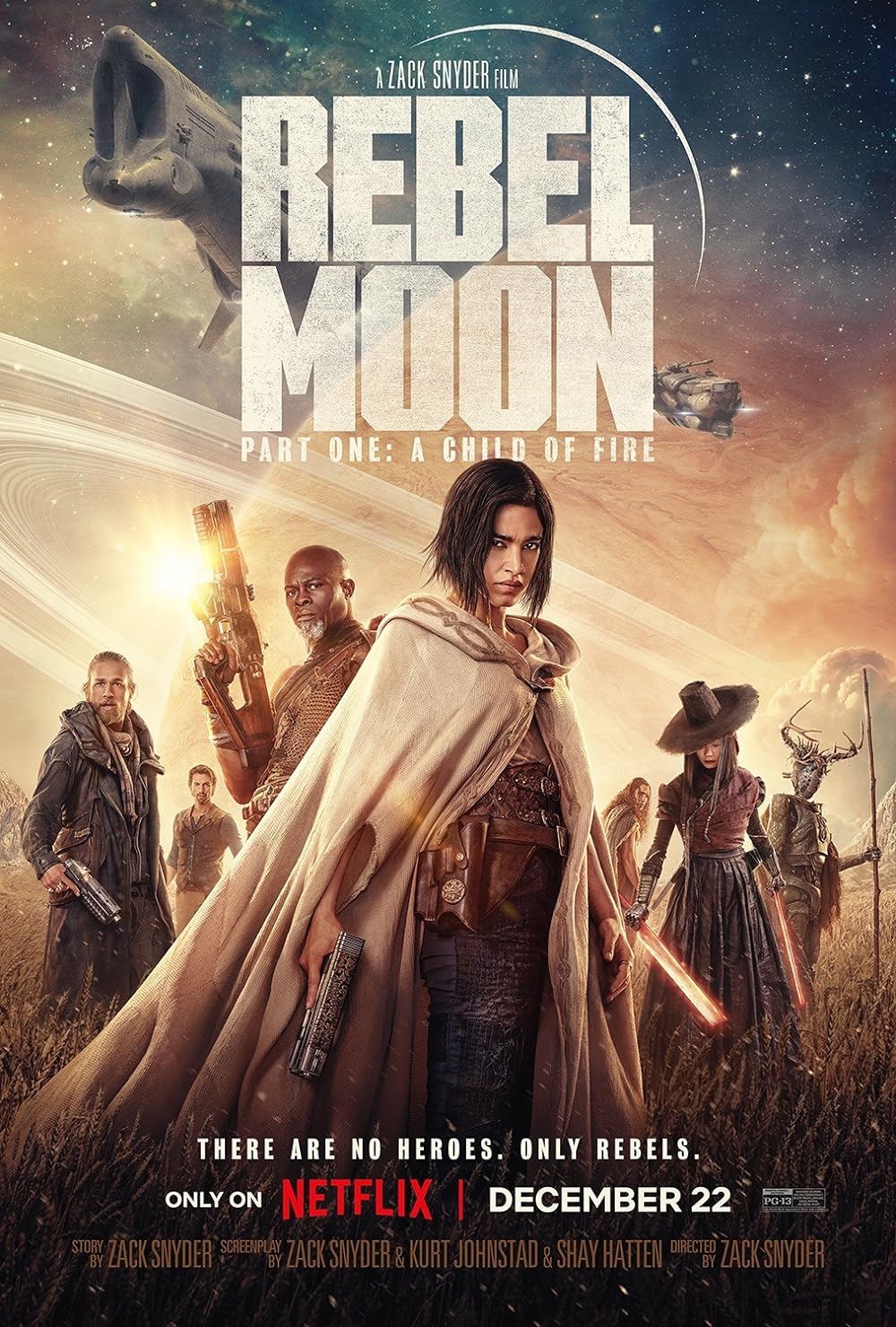
[Editor's Note: normally I try to keep my reviews relatively spoiler free. This is not that, because I did not write it. So beware if you value the artistic integrity of this important work of art.]
"Anti-fan" is a fair enough way to describe my present relationship with Zack Snyder's filmography. I don't find the gratuitous slow-mo nor the self-indulgent parade of self-sacrificing stoics to be compelling cinema, but I'll still keep drinking that garbage. Why? Mainly because I'm a sicko, but also because there are some genuinely (unintentionally, mind you) funny bits, such as Pa Kent insisting on getting sucked into that tornado. Yes, that means I'll sit through four boring hours just to get my "Yes... hahaha... yes!" moment when Jared Leto's Joker shows up for some utterly inscrutable reason—but that doesn't mean I'll actually enjoy the film. Thus, I'm Charmed & Delighted to report that Zacky Boy's latest effort, Rebel Moon: Part One, is in fact just a good movie in the traditional, widely-accepted meaning of the words, no patricidal tornados necessary. That's right: it's for once completely safe to say the Snydster knocked it out of the park with this one.
Now, I know what you're thinking: “wait a minute, isn't Rebel Moon just Adult Star Wars???” Hell, based on the man’s body of work, you might even wonder if Zack's really the guy to pull off the nuanced, gray morality tale of grim PG-13 revolutionaries promised by Netflix's marketing blitz. Trust me: prior to my viewing, I thought the same thing, which is why I was *shocked* to discover that Rebel Moon was not, in fact, a poorly-constructed Rube Goldberg machine of space opera genre tropes, but a fresh, thoughtful examination of imperialism and resistance through the lens of an exciting sci-fi fantasy.
Our story starts with Kora, a humble farmer from a heavily serf-coded community (yes, despite all the fantastical tech seemingly commonplace among this space-faring civilization, Planet Serf has the vibes of a medieval village because Snyder correctly intuits that subtext is for cowards). It's immediately clear that there's more to Kora than meets the eye, and no, she's NOT your bog-standard Snyder protagonist—tragic past, sense of justice inseparable from duty, sacrifice sublimated into heroism, etc.—but a deliberate subversion of such. Far from being some sort of stoic Kryptonian ubermensch who's good at everything with no weaknesses, Snyder knowingly goes out of his way to highlight Kora's femininity and "everyman" quality; by doing so, he cleverly acknowledges the gendered expression of imperialism while also establishing Kora's working class, non-elite character. It would be a huge missed opportunity if he didn't do something like this, and Kora were instead just one of his stock Homeric heroes in a different coat of paint, so it's fantastic to see that's not the case here.
Anyway, Kora's short-lived proletarian lifestyle is rudely interrupted when one of the Empire's Dreadnoughts appears in the skies over Farmville. Oh, did I say Empire? Excuse me, I meant to say *Imperium,* a faction bearing only incidental resemblance to the Empire of Star Wars fame. You see, unlike the Empire, the Imperium incorporates Soviet aesthetics into its fascist cosplay, because it's important and historically literate to acknowledge the billions put to the sword by Karl Marx's socioeconomic theory. A detachment of Imperium forces, led by one Admiral Atticus Noble, descend upon Farmville like a flock of jack-booted vultures; Noble, briefly pretending to be nice, wants Farmville's harvest to feed his troops. When the Head Serf objects on the grounds that Farmville is barely able to feed itself, Kora's friend and fellow prole Gunnar goes full class collaborator and undercuts him, resulting in Noble brutally murdering the Head Serf with a cane, revealing that Noble is, in fact, not nice. The main takeaway from this pivotal scene is that both Noble and Gunnar played popular character Daario Naharis on HBO's hit TV show Game of Thrones.
Having done the requisite amount of mustache-twirling and scenery-chewing, Noble returns to the Dreadnought but leaves some soldiers behind to make sure Farmville pays up. Among this group is Not-C3PO, a droid who lays some exposition on one of Farmville's fair maiden, and Sympathetic Soldier, a soldier who is more sympathetic than the other space fascists. These are notable characters who won't be swiftly discarded after the next couple scenes, which is good, because if they were, well, that would be something of a shame given that Not-C3PO is our first cast member who actually seems potentially interesting. Snyder deftly establishes Not-C3PO as an interrogation of fascism's relationship with technology, taking that which ought to be liberatory and turning it into a tool of oppression. Likewise, the soldiers are given careful characterization as opposed to being treated like faceless cannon fodder NPCs—we come to recognize the grim reality that these soldiers could easily have been among our beloved serfs themselves had they not been coerced into the Imperium's service, simultaneously commenting on imperalism's economic exploitation of the lower classes and adding narrative heft to the proceedings by humanizing the enemy. This careful contextualization helps us to better understand Sympathetic Soldier's perspective while preventing the space fascists from coming across as easily-dismissed cardboard cutout throwaways with less personality than the actual droid, so it's a good thing that Snyder did this as it truly sets the stage for the film's morally complex core.
Unfortunately, Sympathetic Soldier's only character trait is almost immediately put the test when the first thing his bros do is lay hands upon the aforementioned fair maiden—or rather, they *attempt* to, before Sympathetic intervenes on her behalf. Things look bad for Sympathetic until Kora shows up with the rest of the serfs, whom she has successfully organized into a ragtag resistance. It would have been extremely easy to have Kora personally kill all the space fascists herself in slow motion, but thankfully Snyder resists such a shallow impulse and instead cleverly uses Kora's actions to demonstrate that revolutions are social movements made up of people and thus much bigger than any one person. The successfully captured Imperium soldiers tried by a serf military tribunal; after much deliberation and heated debate, a democratic decision is made to execute the POWs, with the fair maiden casting the deciding vote. Kora turns to the camera and reflects, "a justified resistance may engage in otherwise morally questionable actions in due course of ending oppression by any means necessary; the myth of the 'perfect victim' is a counterproductive liberal fantasy cynically deployed in defense of the status quo." Truly, this is all much more morally gray and gritty than Star Wars, a franchise which exists only to sell toys to children.
We learn a little about Kora's obligatory tragic backstory through flashback glimpses of her checkered past. Her home planet was wrecked by the Imperium when she was but a young girl, but instead of killing her like everyone else, the then-leader of Imperium forces, Belisarius, decides to adopt her instead (as wise man once said: real recognizes real). Growing up on the Motherworld, Kora learns how to fight and gets so good at enforcing the state's monopoly on violence that she becomes an elite bodyguard to the princess, who has the power to bring birds back to life through some mystical method that does not involve using the Force. While we may wish to learn more about what seems like some actually cool sci-fi fantasy stuff, that will have to be saved for Rebel Moon: Part Two, because Kora eventually grew weary of the managerial class's bourgeois decadence and self-exiled to Planet Serf, leading to present events.
The remainder of the film's runtime is given over to the exploits of the resistance as they employ guerrilla warfare to stay one step ahead of a much more powerful and technologically superior opponent. We get to cheer on the tenacity and ingenuity of the common man in the face of seemingly impossible odds as we witness on-screen events deliberating recalling real-world anti-imperial resistance movements, which Star Wars never did before. Also, unlike Snyder's other films, which tend to be somewhat self-serious, Rebel Moon: Part One even sees fit to inject some good ol' proletarian humor into the proceedings, with one particularly funny moment occurring when Not-C3PO, who did not just literally run out of the movie entirely after his last scene, jokingly suggests Kora leave Planet Serf to go gallivanting around the galaxy, assembling a crew of elite warriors to take back to Planet Serf. These warriors could include such personalities such as a rascal-rogue with dubious morals met in a wacky space bar, an indigenous-coded prince suffering indentured servitude before realizing he can just leave, a martial artist lady with two red laser swords, a guy named Blood Axe, etc. and these would be the actual folks to bring the fight to Noble and the Imperium. It's a very amusing idea which Kora laughs off, refuting the Great Man Theory of History and stating that the good people of Planet Serf don't need to derive legitimacy from any such elite vanguard. Everyone has a good chuckle as the rebel forces grimly prepare for a seemingly doomed final showdown against the Imperium, only to learn that their brave resistance has helped inspire similar movements on other worlds, and help is on the way. This conclusion leaves us sufficiently tantalized for the upcoming Part Two, which will no doubt expand the scope of the Rebel Moon cinematic universe in an organic and thought-provoking way.
Needless to say, I was quite surprised and impressed with this film. Unfortunately, the highest rating I can give it is still only 3/10 due to the existence of a lengthier R-rated Snyder Cut edition, which—if history is any guide—will be a vastly superior viewing experience. If the evil real-world Imperium of Netflix ever sees fit to release this version, I will definitely watch it and update this score to the 10/10 it deserves.
Score: 3/10
IMDb: Rebel Moon - Part One: A Child of Fire
Guest Reviewer: Paul, but not the one who is a psychic octopus, nor the one who is Muad'Dib. I'd have inserted his links but he has nothing to sell except a bridge, if you believe anything he wrote.
PS: What can I add to Paul's dissertation on glory above? Well, I suppose I can add he did not cover what I think is the worst part of the film, which is the totally disjointed nature of the scenes. There is absolutely no sense of time or place; everything happens and then there's a quick cut and they are somewhere else entirely, with little suggestion that they were ever anywhere in between. Transitions are important! It reminds me of the worst tendencies of Batman v Superman, a movie notorious in my personal pantheon for forming the bedrock of my Bottom Five Movies of All Time (a post I will some day write).
